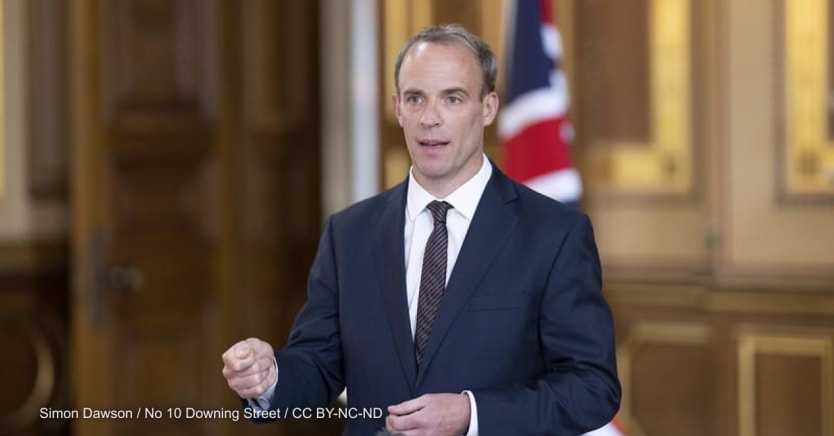
Foreign Secretary Dominic Raab on Monday suggested the United Kingdom could withhold aid to Afghanistan to hold the Taliban to account, even as calls grew for the government to step up relief efforts to the region.
The U.K. spent £292 million on bilateral aid in Afghanistan in 2019, according to official statistics, but has allocated £93.8 million for the 2021-2022 financial year. An additional Foreign, Commonwealth & Development Office humanitarian crisis reserve is worth £30 million, but FCDO did not respond to questions asking if it would change in light of the crisis.
It is also unclear how development in the country will proceed in the future, with many U.K.-based NGOs remaining tight-lipped due to the sensitivities and fast-moving nature of the situation. The HALO Trust, a charity that clears land mines, tweeted: “We will continue to serve the people of Afghanistan. We will persist.”
Raab, who was criticized for being on vacation while the situation in Afghanistan was worsening, broke his silence about events there late Monday afternoon. He insisted “there are levers” for holding the Taliban accountable, ranging from “sanctions that we can apply to the ODA [official development assistance] that we will hold back, pending reform.”
Preet Kaur Gill, shadow international development secretary, called for humanitarian aid and assistance to be ramped up in the countries neighboring Afghanistan, which are expected to soon host large numbers of refugees. She also called for a plan to ensure the safety of development programs, particularly those focused on helping women and girls. “There must be a coordinated approach and response … to make sure especially those that are left in Afghanistan get the support they need,” she said.
The U.K. has a “debt of honor” according to Andrew Mitchell, the Conservative member of Parliament who organized a rebellion against the government's aid budget cuts.
“When and if conditions allow we must continue to provide expertise and development money to build state capacity to provide for the people of Afghanistan, whether through educating girls, assuring perinatal healthcare, or continuing the work strengthening local governance structures where British expertise and brave development personnel made a quantifiable difference,” he told Devex.
Layla Moran, Liberal Democrat spokesperson for foreign affairs and international development, called for Prime Minister Boris Johnson to work with international allies to create a “safe corridor of land from Kabul to an international border.” She said this might offer an escape route from a “murderous, tyrannical and barbaric regime,” adding, “All those who need to escape the Taliban, especially women and girls, must be given the chance.”
“To pull the rug out from our allies like this is short-sighted, narrow-minded and indefensible.”
— Stewart McDonald, Scottish National Party spokesperson for defenseThe concern for women and girls was also echoed by Sarah Champion, chair of the International Development Committee of MPs. She called for the U.K. to fulfill “any pledged donations quickly and completely,” adding, “Doing anything else will be a betrayal of the Afghan people and the legacy of the soldiers who lost their lives in the pursuit of their freedom.”
“At the very least, anyone that’s been working for a British financed NGO, anyone that’s been working with our troops or humanitarian work, ought to be guaranteed at least a safe passage, if not asylum status in this country,” Champion told Devex.
The U.K. government’s aid cuts to Afghanistan, alongside the withdrawal of troops, had left “the country’s fragile democracy to crumble,” according to Stewart McDonald, Scottish National Party spokesperson for defense.
“To pull the rug out from our allies like this is short-sighted, narrow-minded and indefensible. Aid spending on Afghanistan must be increased, and the impending cut to the overseas aid budget must be cancelled and reinstated at 0.7% [of gross national income] immediately,” he said in a statement.


